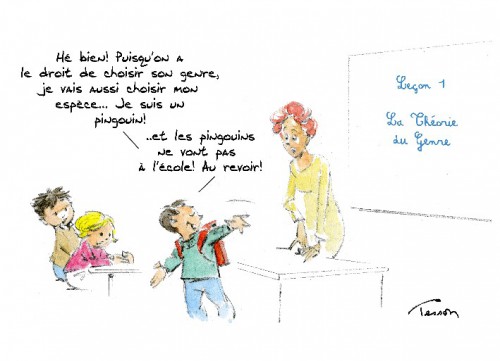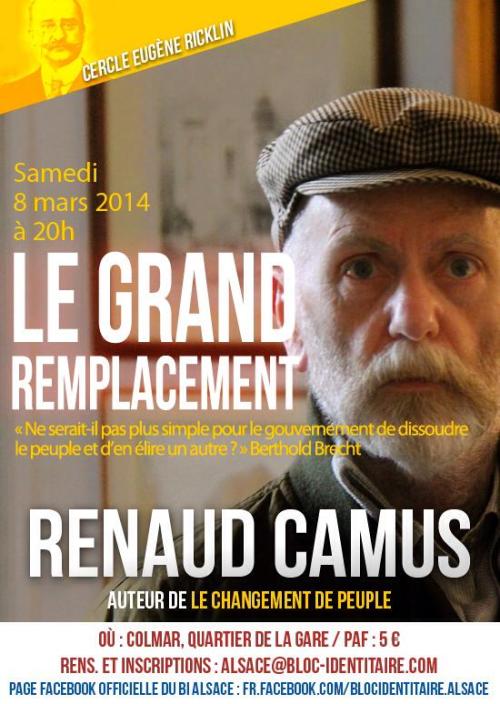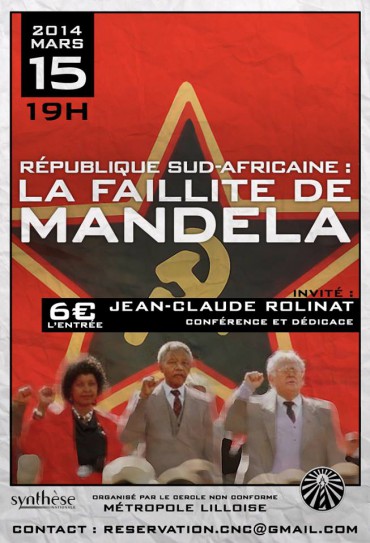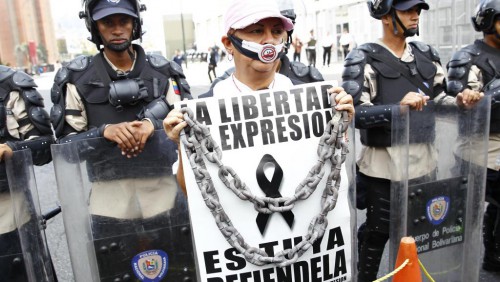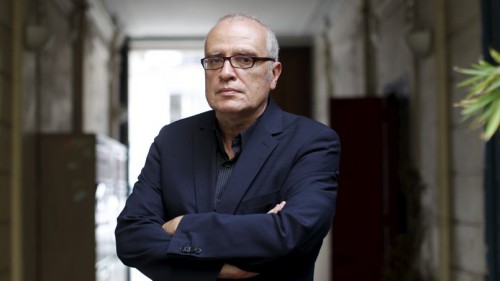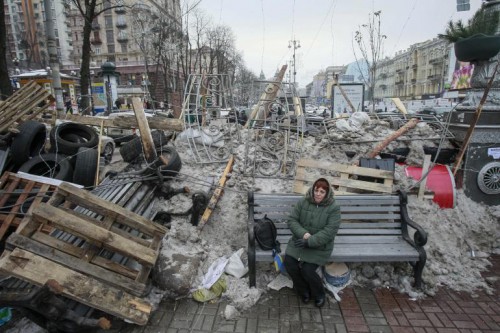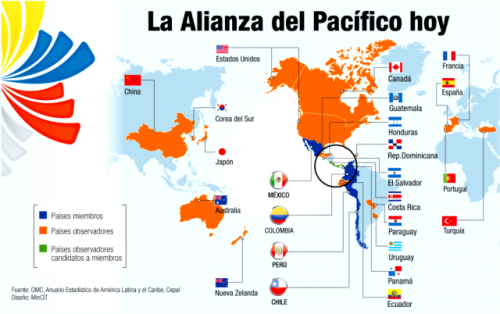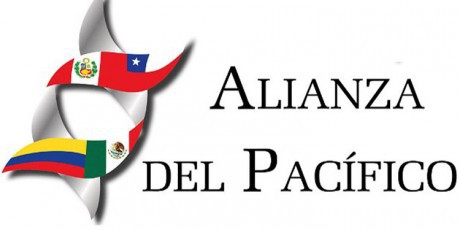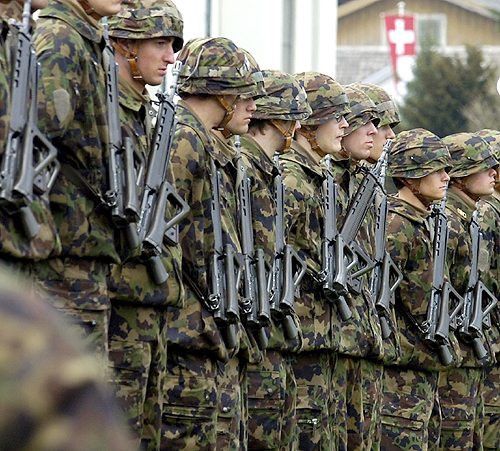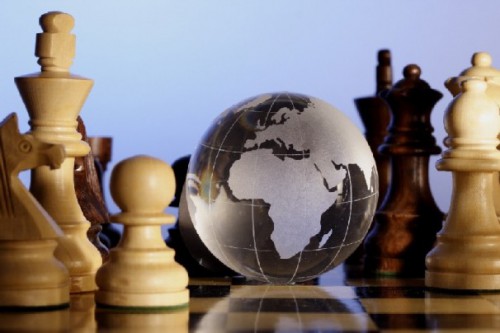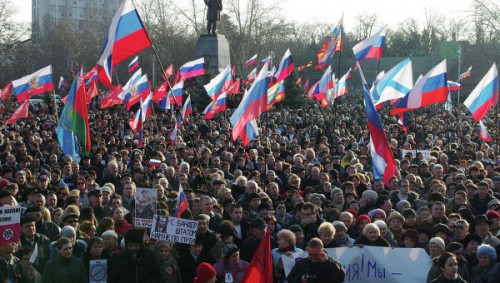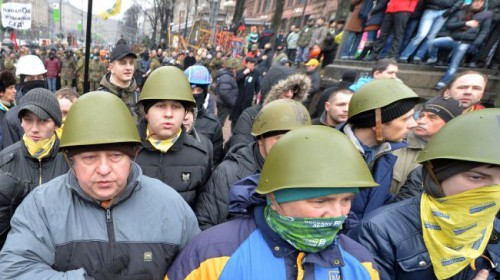
Retour sur la question communautariste
|
par Laurent Bouvet
Ex: http://philippedelbauvre.blogspot.com
|
|
Le terme « communautarisme » est étranger à l’oreille républicaine française. Il ne correspond à aucun de nos repères historiques, juridiques ou philosophiques. Il n’est pas compatible avec la conception que nous nous faisons, collectivement, du lien social et plus largement du vivre-ensemble. Il nous est même difficile de le comprendre et de l’utiliser. Lorsqu’on le fait, c’est avec beaucoup de maladresse alors que ce devrait être avec prudence, en particulier lorsque l’on compare son usage avec celui qui en est fait dans d’autres pays, les Etats-Unis en premier lieu.[1]
Comme le remarque Pierre-André Taguieff, « Dans ses usages hexagonaux contemporains dominants, ce terme en ‘isme’ ne désigne pas une idéologie politique (comme le nationalisme), ni une configuration idéologique (comme le racisme), ni un style politique (comme le populisme), ni une école de pensée (comme la philosophie politique des ‘communautariens’ américains ou canadiens) : il dénomme un ennemi abstrait, il désigne une menace, il signale un danger, il exprime une inquiétude et indique en conséquence une tendance inquiétante, il dévoile une tentation supposée croissante, il dénonce une ‘dérive’ (dont on sait que, conformément à l’idée reçue, elle ne peut mener qu’au ‘pire’). »[2] Personne en effet ne se déclare – ou ne défend en tant que telle une position – « communautariste ». Si le terme avait figuré dans le Dictionnaire des idées reçues de Flaubert, on aurait sans doute pu y lire : « Communautarisme : toujours le dénoncer. »
Si l’on s’en tient à une définition neutre, le communautarisme peut se résumer à un système social et politique dans lequel la communauté subjugue l’individu. Mais alors qu’est-ce qu’une communauté ? La sociologie allemande de la fin du XIXe siècle, à travers les travaux de Max Weber reprenant en cela ceux de Ferdinand Tönnies, avance une distinction entre la communauté (Gemeinschaft) et la société (Gesellschaft).[3] La communauté est une forme d’organisation sociale qui suppose un lien organique entre ses membres, qui s’ancre, par exemple, dans la vénération des ancêtres, la valorisation du passé, les liens de sang, ethniques ou religieux. Dans une communauté, ces liens nous unissent malgré nous, avant même que nous soyons considérés comme des personnes autonomes – l’individu ne peut donc exister en tant que tel. Dans cette perspective sociologique, ces formes communautaires appartiennent au passé, c’est-à-dire avant la naissance de la modernité philosophique à partir des XVIIe et XVIIIe siècles, celle qui débouchera sur notre conception de l’individu moderne comme sujet autonome de raison. La « société » procède de cette conception individualiste du sujet, d’un individu préexistant à toute appartenance sociale, titulaire de droits avant même de « faire société ». Ainsi, dans la société au sens moderne du terme, l’individu l’emporte-t-il sur la communauté, sur ses appartenances multiples, grâce à sa capacité de choix, d’utilisation libre de sa raison autonome. Le lien social devient dès lors un lien volontaire d’association avec les autres, déterminé par un choix rationnel fait par des égaux, autour d’intérêts communs. Il existe donc une différence essentielle entre une forme ancienne et une forme moderne de sociabilité des individus : la communauté étant celle des Anciens, la société celle des Modernes.
Pour autant, renvoyer la forme communautaire de la vie sociale au passé n’est pas nécessairement perçu comme une condamnation. Les communautés traditionnelles peuvent très bien apparaître, à l’âge moderne, et de manière positive, comme des lieux de préservation, de refuge et de qualité du lien entre les membres que la « société des individus », selon la formule de Norbert Elias, n’est pas ou plus en mesure d’offrir.[4] Les communautés villageoises, de proximité (la famille, le quartier…) voire religieuses peuvent en effet se révéler pour les individus, au-delà d’un frein à leur continuelle et légitime émancipation, comme la possibilité d’un « entre soi » protecteur, contre l’anonymat et le manque de chaleur des relations dans les grandes sociétés impersonnelles par exemple, dont la « grande ville » serait la quintessence.
Si cette approche, classique, permet de poser un premier repère utile dans le débat, elle n’épuise donc pas l’usage du terme « communauté » même en français. Le mot et la chose ont en effet subsisté à l’âge moderne et pas seulement dans le sens induit par Tönnies et Weber de l’invocation d’un passé révolu. La « communauté » au singulier fait même, depuis longtemps, partie du vocabulaire politique dans une version noble, adoubée par le républicanisme français : qu’il s’agisse de la communauté des citoyens ou de la communauté nationale. Toutes deux valorisent le caractère exceptionnel du lien social français et, au-delà, la construction moderne d’un Etat-nation berceau de la souveraineté d’un peuple un et invisible, uni dans la communion solidaire permise par l’appartenance nationale.[5] Cette communauté au singulier correspond ainsi parfaitement à l’idée rousseauiste d’unanimité du corps social dès lors qu’il exprime sa volonté (générale) politique.
Le « tournant identitaire »
Pour comprendre le communautarisme aujourd’hui, il est nécessaire de remonter aux années 1960-70, au moment de ce que l’on a appelé le « tournant identitaire ».[6] A ce moment-là, aux Etats-Unis d’abord puis de manière plus générale dans les sociétés occidentales, de nouvelles aspirations ont émergé qui avaient pour trait commun la mise en exergue d’identités de nature ethnique, raciale, sexuelle (mouvement des femmes, mouvement homosexuel…) ou régionaliste. Cette survenance identitaire a pu être analysée comme une revendication posée contre la société des individus libres, sujets autonomes de raison et titulaires de droits égaux, celle de la modernité libérale et démocratique, et de sa contestation marxiste par exemple, dans laquelle les enjeux étaient essentiellement liés aux rapports de forces socio-économiques ou à la lutte des classes. C’est à une véritable redéfinition du pluralisme que l’on a assisté, au passage du pluralisme « classique », celui de la diversité des intérêts, à un pluralisme nouveau, celui de la différence des identités. L’identité et ses critères multiples venant se substituer ou du moins compléter les intérêts classiques dans la détermination du comportement des individus et des groupes sociaux.[7]
Des demandes identitaires nouvelles qui n’ont été épuisées historiquement ni par la question sociale ni par dans la question nationale au XIXe sont ainsi apparues et devenues structurantes dans les débats de société contemporains à partir de cette période charnière de la fin des années 1960. Des groupes, que l’on a appelés « minorités » en raison des critères d’(auto)identification de leurs membres, décalés par rapport à ceux qui « dominent » la société, sont les porteurs de ces identités et souhaitent les voir reconnues dans l’espace public.
Aujourd’hui, les « communautés » qui sont en cause lorsque l’on évoque, en France tout particulièrement, le communautarisme relèvent précisément de ces catégories identitaires et sont donc avant tout des minorités fondées sur des critères d’identification dits « culturels » – qu’il s’agisse de critères plus ou moins prescrits (ou volontaires) : le sexe (ou plus exactement le genre), la couleur de la peau (la « race », l’ethnie…), l’orientation sexuelle, la religion, etc. Cette crainte d’une exaltation des identités « culturelles » qui viendraient remplacer les critères traditionnels d’identification de l’individu dans la modernité – le territoire et la classe sociale – renvoie donc à un contexte socio-historique particulier, celui du vaste mouvement qui traverse les sociétés occidentales depuis les années 1960. Un mouvement qui lie politique et culture d’une manière inédite, en faisant de l’appartenance identitaire la source principale sinon exclusive de l’être individuel et social de chacun.[8]
Des communautarismes
Si le communautarisme fait peur, c’est donc d’abord en raison du contenu identitaire qu’il véhicule, parce qu’il met en jeu des formes non modernes voire antimodernes de prédétermination de l’individu (genre, race, ethnie, religion…) et qu’il met en scène des groupes sociaux spécifiques minoritaires mais dont les revendications de reconnaissance renvoient les sociétés auxquelles elles s’adressent à des pages sombres de leur histoire : esclavagisme, ségrégation, colonialisme, domination, exploitation, humiliation, persécution… comme dans le cas archétypal en la matière des Noirs américains. Si le communautarisme fait peur c’est aussi parce qu’il implique des types de mobilisation qui échappent très souvent – ne fût-ce que parce que ces groupes n’ont pas de place sur la scène politique classique – aux formes et aux répertoires conventionnels de l’action politique dans les démocraties, et se situent hors des partis politiques et des institutions de représentation et de médiation, elles-mêmes fondées sur des critères de « territoire » et de « classe » bien davantage que sur des critères de race, de genre, d’ethnie ou de préférence sexuelle. Enfin, si le communautarisme fait peur c’est parce qu’il annonce une société dans laquelle l’individu moderne verrait ses choix remplacés ou dictés par ses appartenances identitaires.
On voit ainsi se dessiner, en creux, une triple approche du communautarisme : philosophico-anthropologique, socio-historique et politico-institutionnelle.
Le communautarisme philosophique et anthropologique a été théorisé notamment par les auteurs « communautariens[9] » aux Etats-Unis dans les années 1980, autour de la critique du libéralisme de John Rawls, de l’atomisme individuel et de la nécessité d’une réhabilitation de la communauté face à l’individu dans la société moderne. Ils ont ainsi fourni de nouveaux arguments au débat identitaire américain autour de l’idée d’une revalorisation de l’appartenance communautaire de l’individu, qui ne peut être considéré sans ses différentes attaches sociales, culturelles, historiques… Différents points de vue communautaristes ont ainsi été développés de la part d’auteurs comme Alasdair MacIntyre, Michael Sandel, Charles Taylor et Michael Walzer[10], qui soulignent la diversité des questions abordées et des niveaux d’interrogation, de la philosophie à la sociologie en passant par l’anthropologie ou la théorie politique. Toutefois, un certain nombre de thèmes communs permettent de dégager une unité de la critique adressée par ce courant à la théorie sociale libérale. Cette critique communautarienne a influencé à son tour la théorie politique et sociale libérale et conduit à une meilleure prise en compte de l’appartenance communautaire dans l’évolution de la demande identitaire formulée par les minorités qui ont animé le tournant identitaire. Mais la communauté est également apparue, à travers ces travaux, comme une entité sociale limitative voire dangereuse pour l’individu moderne – une entité ne répondant pas à de nombreuses questions sur l’articulation avec le niveau communautaire politique légitime dans l’Etat-nation moderne, sur l’ouverture à la différenciation à l’intérieur même des communautés, sur l’articulation entre les différentes communautés d’appartenance de l’individu, etc.
Il existe par ailleurs un communautarisme sociologique et historique, qui s’est développé essentiellement et sous de multiples formes, à travers le multiculturalisme, à partir des revendications identitaires des minorités culturelles contre l’oppression ou la domination qu’elles ont subies historiquement. Dans cette logique, l’appartenance à une culture ou à un « groupe » culturel fait figure de dimension essentielle de l’autonomie de l’individu. Dans la modernité vue selon la perspective du multiculturalisme, la culture à laquelle on appartient est le contexte qui permet à l’individu de faire des choix autonomes. Si cette culture est faiblement reconnue, alors la marge d’autonomie dont dispose l’individu est réduite. D’où l’importance du thème de la reconnaissance identitaire, développé notamment par des auteurs canadiens tels que Charles Taylor ou Will Kymlicka.[11] Si l’on ne se place plus seulement du point de vue de l’individu mais aussi de celui de la société dans son ensemble, la culture comme élément constitutif de l’identité devient incontournable : ignorée, elle peut devenir source de conflit ; reconnue et intégrée, elle enrichit l’ensemble social. Si l’on veut vraiment comprendre ce qu’est l’identité culturelle pour l’individu comme pour la société, il est pourtant nécessaire de dépasser cette approche simpliste, ne serait-ce que pour prendre en compte les situations moins nettes que constituent les appartenances culturelles multiples ou la mise en avant de volontés de rupture avec une affiliation culturelle, autant de situations courantes dans les sociétés multiculturelles contemporaines.
Ainsi, les présupposés multiculturalistes, pertinents lorsqu’ils établissent la coexistence de cultures différentes et insistent sur la nécessité de reconnaître les aspirations des différents groupes présents au sein d’une société dans l’espace public, se trouvent-ils malmenés lorsqu’il s’agit de prendre en compte ce qui apparaît comme un phénomène intimement lié à cette « considération » pour la différence : à savoir la possibilité pour certains individus ou pour certains groupes de ne pas se reconnaître dans leur culture d’origine – celle à laquelle la société les rattache spontanément en raison de leur origine nationale, religieuse, ethnique, etc. –, soit qu’ils ne le désirent pas, soit qu’ils ne le peuvent pas, soit que leur culture d’appartenance n’offre pas de ressources suffisantes pour qu’ils puissent s’identifier pleinement à elle, soit qu’ils soient contraints par quelque événement d’abandonner tout ou partie de leur identité, soit encore qu’ils désirent devenir « quelqu’un d’autre », membre d’une autre culture ou d’autres cultures. Un conflit se dessine alors entre la « liberté de choix » de son appartenance – ou, concrètement, de l’affichage de tel ou tel critère de sa propre identité dans l’espace public – et les contraintes incontournables d’une appartenance marquée dans la société : couleur de peau, pratique religieuse visible, sexe, etc. Ce conflit témoigne pleinement de la modernité et des difficultés de l’individu à se « situer » dans son environnement : à la fois semblable, parce qu’égal, aux autres hommes et radicalement différent d’eux, il a besoin d’indications pour s’orienter dans l’espace identitaire de la société et des communautés d’appartenance au sein desquelles il vit.
On peut repérer, enfin, un communautarisme politique et institutionnel, qui renvoie à la déclinaison dans le discours, les programmes et l’action politique des deux premières formes précitées – quand ce n’est pas au simple rafraîchissement de pratiques traditionnelles[12]. On se contentera de l’illustrer ici par l’exemple de la « troisième voie » telle qu’elle a été proposée par Tony Blair au Royaume-Uni[13]. Le communautarisme tel qu’il a été utilisé par les nouveaux travaillistes au milieu des années 1990 a notamment permis de toucher une large partie de l’électorat conservateur, soucieux avant tout de l’unité sociale du pays, en renvoyant à la philosophie qui animait l’action de Benjamin Disraeli, par exemple[14], tout en répondant à la préoccupation traditionnelle de l’électorat travailliste d’une solidarité communautaire, héritage de l’ouvriérisme organisé du xixe siècle. Toutefois, le communautarisme comme valeur-clef de la troisième voie dépasse largement la référence électorale opportuniste. Celui-ci puise ses racines dans la tradition sociale-chrétienne – dont Tony Blair s’est constamment revendiqué – sans trop apparaître comme un archaïsme en raison de son articulation avec le respect de l’individu et de ses droits – on retrouve là d’ailleurs un des traits du communautarisme « à la française » que fut le personnalisme des années 1930-1940[15]. La politique apparaît dans ce cadre communautariste comme une préoccupation morale autant que technique – d’autant plus, aujourd’hui, que la technique s’avère de moins en moins efficace pour influer sur la réalité, notamment économique. Plus concrètement, le communautarisme de la troisième voie concerne toutes les communautés auxquelles l’individu peut s’identifier : la nation, l’école et la famille, en particulier. Le regain d’intérêt pour la famille est d’ailleurs significatif du renouveau doctrinal du Parti travailliste qui a recommencé à prendre en compte avec Tony Blair un phénomène à ses yeux oublié ou occulté jusqu’ici par la gauche : le fait que la désintégration de la famille sous l’effet de l’individualisme, de la libéralisation des mœurs et de la crise sociale, conduit à une montée de l’insécurité et de l’exclusion.
République versus communautarisme : l’exception française
Dans le cas français, un débat caricatural masque souvent la réalité des enjeux. Ce débat oppose les tenants d’un républicanisme idéal – où la République une et indivisible ne veut rien voir des différences entre les individus parce que ceux-ci s’en dépouillent lorsqu’ils entrent dans l’espace public – à ceux du « communautarisme » qui renvoient chacun au critère dominant de son identité, un critère qui nous est imposé par « l’arrière-plan » culturel, religieux, ethnique, racial, sexuel… dans lequel on vient au monde et évolue. Chacun ne pouvant finalement prétendre à autre chose qu’à la reconnaissance par les autres de ce critère d’identification dirimant dans l’espace social réduit à une juxtaposition de communautés identitaires. Les républicains accusent les communautaristes d’une dérive tribaliste, différentialiste, essentialiste et séparatiste[16], tandis que les « communautaristes » accusent les républicains d’une hégémonie culturelle, politique et sociale dominatrice, colonisatrice, esclavagiste et sexiste[17].
Le républicanisme à la française[18], forgé à partir de la Révolution, s’est, de fait, toujours adapté, dans sa pratique étatique en particulier, aux nécessités de la démultiplication culturelle du pays et de la société. Il l’a fait notamment pour compenser l’existence de discriminations qui ont toujours existé malgré la pétition universaliste et le caractère « aveugle » aux différences de l’idéal républicain. Symétriquement, le communautarisme tel qu’il a été décrit ici n’est souhaité par personne et n’inspire aucune revendication sérieuse – si ce n’est de la part de quelques groupuscules très vite circonscrits[19]. Ce qui veut dire que le républicanisme français, s’il fait sans doute exception, se révèle surtout paradoxal dans le rapport de ses principes à la réalité. Et ce, suivant un triple mouvement : il est à la fois plus flottant sur la garantie pour tous de l’égalité et de la neutralité de l’Etat, plus souple dans sa manière de répondre aux différences et plus fort dans sa capacité d’intégrer les différences qu’on ne peut le lire dans sa philosophie et dans ses textes – et, surtout, qu’on ne le dit habituellement lorsqu’on évoque son inadaptation à l’époque, sa crise ou encore son déclin.
Le républicanisme français est plus flottant que ses principes ne le laissent supposer quant à la réalité de l’égalité entre citoyens – ou dans l’accès à la citoyenneté, sésame de l’égalité républicaine, de certaines catégories de la population. Son aveuglement aux différences, revendiqué et institutionnalisé[20], a en effet produit toute une série de « discriminations[21] » dont la société porte aujourd’hui les stigmates profondes et qui sont autant de « démentis apportés à l’idéal républicain[22] ». Ainsi en va-t-il du lien étroit entre république et colonialisme à la fin du xixe et au début du xxe siècle[23] ; ou du statut des femmes dans la vie politique, économique et sociale – ainsi du refus du suffrage féminin, accordé tardivement par la République renaissante, en 1944, alors que, dans la plupart des autres pays démocratiques, l’affaire était entendue depuis la fin de la Première Guerre mondiale.
Mais le républicanisme français est également beaucoup plus souple sur ces mêmes principes face à des situations contrastées d’inégalités de traitement. Ainsi existe-t-il depuis longtemps une « discrimination positive » à la française. Sa caractéristique principale, contrairement aux dispositifs d’autres pays, notamment aux Etats-Unis, est de ne pas s’appuyer sur des critères identitaires tels que « l’origine » ou la « race », conformément à l’article 1er de la Constitution, qui dispose que la République « assure l’égalité devant la loi de tous les citoyens sans distinction d’origine, de race ou de religion » mais sur le « territoire ». Cette discrimination positive à la française concerne des domaines aussi variés que la politique de l’emploi (handicapés, jeunes, femmes, fonction publique…), les règles électorales (parité) ou l’aménagement du territoire (ZEP, ZUS, ZRU, ZFU, statuts territoriaux particuliers en Corse et outre-mer…) selon des modalités et un développement récent variés[24]. Si l’on observe la situation dans la durée, on peut donc avoir le sentiment que cette souplesse dans l’adaptation des principes à des demandes spécifiques d’intégration ou de revendication de droits s’est peu à peu substituée au caractère flottant évoqué précédemment comme modalité principale du rapport entre les valeurs républicaines et les exigences de la société.
On remarquera, enfin, que le républicanisme à la française se révèle aussi, à l’usage, et au-delà de ses principes affichés, plus fort, c’est-à-dire à la fois efficace et attractif quant à l’intégration des différences, et ce malgré les discriminations et grâce aux accommodements avec les principes républicains que l’on vient d’évoquer. On peut ainsi citer l’exemple bien connu mais toujours significatif des mariages « mixtes » entre un national et un conjoint étranger, mais aussi entre conjoints nationaux d’origines ou de confessions différentes, qui distingue la France d’autres pays européens tels que l’Allemagne ou le Royaume-Uni[25]. Plus généralement, l’une des spécificités françaises, observée tant sur le plan des pratiques culturelles que du point de vue des « violences urbaines », tient à la mixité ethno-raciale constatée aussi bien dans les groupes musicaux (de rap notamment) que dans les groupes d’émeutiers (ce fut le cas en novembre 2005) qui s’assemblent par quartier ou par « cité » plutôt que par origine identitaire et n’hésitent pas à s’en prendre à leurs « semblables ». Mais c’est surtout d’efficacité juridique et politique qu’il faut gratifier le républicanisme en matière de maintien de l’intégration des différences, qu’il s’agisse, comme en témoigne des exemples récents, du refus de voir des parties du corps des citoyens (Corse, Charte des langues régionales…) se distinguer sur une base identitaire toujours incertaine (langue, coutumes, religion, ethnie…) ou de la mobilisation en faveur de valeurs telles que la laïcité (loi sur le port des signes religieux à l’école, par exemple).
Enjeux communautaristes
Au-delà des questions principielles, c’est au travers d’enjeux politiques et sociaux concrets que s’articule désormais le débat public sur ces questions. Il n’est pas anodin d’ailleurs que ce soient des « communautés » ou bien encore des « minorités » apparaissant ou se définissant comme telles dans le débat qui en prescrivent les contours et en fixent l’agenda. On prendra ici, à titre d’illustration, trois exemples de ce qui forme aujourd’hui le quotidien d’un questionnement identitaire suivant les lignes du communautarisme.
La première question de ce type qui se pose aujourd’hui en France, comme on l’a encore vu récemment à la lumière des débats sur l’identité nationale ou sur la burqa lancés par le gouvernement, est celle de l’islam. Le double caractère minoritaire de la religion et de l’origine ethno-raciale dominante de ceux qui s’en réclament crée en effet une situation très particulière. A la fois parce que l’islam en France est très varié (il réunit des populations originaires, qu’elles soient de nationalité française ou étrangères, de pays arabes du Maghreb comprenant eux-mêmes des minorités, berbérophones par exemple, mais aussi d’Afrique noire et de pays d’Asie, de la Turquie à l’Asie du Sud), et parce qu’il pose « un » problème à une société issue d’un compromis longuement mûri entre vieille tradition chrétienne (à forte dominante catholique) et forte exigence laïque fondatrice de l’identité républicaine – comme en témoigne l’exemple du financement des mosquées. L’une des occasions de mise en jeu d’une forme de communautarisme musulman s’est dessinée ces dernières années à partir de la question dite du voile (ou du foulard). Cette question désormais bien connue, depuis son surgissement dans l’actualité, en 1989, jusqu’au vote de la loi sur l’interdiction du port de signes religieux ostentatoires à l’école en mars 2004 et aujourd’hui à propos de la burqa, renvoie bien au registre de la peur du communautarisme, vu à la fois comme un repli identitaire en dissidence de la société et comme une violation des droits de l’individu (ici les jeunes filles portant le voile ou les femmes portant le voile intégral).
Les tentations communautaristes peuvent bel et bien exister au sein de certaines composantes de l’islam (comme chez Tariq Ramadan ou à l’OUIF), qui n’hésitent pas, dans leur propagande la plus radicale, à prôner la priorité de la loi de Dieu sur celle de la République, mais elles restent marginales, notamment si l’on mesure leur influence non pas aux éclats médiatiques mais aux statistiques relevées de telle ou telle pratique – comme celles qui confirment le tassement des « affaires » de voile dans les écoles de la République depuis la loi de 2004. Ce n’est d’ailleurs pas seulement leur identité musulmane que réclament de voir reconnaître la plupart des musulmans en France, mais à la fois, et pour certains plus encore, leur identité d’Arabe ou de « Noir », celle de leur origine ethno-raciale. C’est pourquoi, notamment, la tentative de traitement politique de cette question par l’instauration d’un Conseil français du culte musulman en mai 2003, outre les nombreuses questions de méthode qu’elle soulève (représentativité des organisations, rôle des pays étrangers…), ne règle pas les aspirations à la reconnaissance identitaire et sociale de populations que l’on suppose majoritairement musulmanes. Seule une intégration républicaine pleinement assumée (« loi sur le voile ») mais aussi pleinement inclusive (lutte active contre les discriminations, politiques actives de rattrapage social…) peut répondre à une telle demande.
Une deuxième question, surgie plus récemment dans le débat public, est celle des « Noirs » en France. Les données sont assez différentes de celles de l’islam, même si, comme on l’a souligné, elles se recoupent en partie chez certains individus qui se revendiquent à la fois comme Noirs et comme musulmans. La catégorie identitaire « noir » existe depuis longtemps déjà. Elle s’est construite au croisement de l’héritage colonial et de l’esclavage dès le xvie siècle, notamment aux Antilles, et de la montée en puissance de nouvelles revendications identitaires à la suite du « tournant » des années 1960-70 (en France, ces revendications ont pris la forme du régionalisme corse, breton ou catalan par exemple, et dans les DOM-TOM, de manière plus radicale, d’une identité exaltée précisément pour mettre en avant cette négritude longtemps honteuse, en passant d’une identité prescrite par les colonisateurs et les maîtres blancs à une identité revendiquée comme « belle » : retour à la langue créole, « culture » caribéenne, etc.). Les mouvements identitaires de cette époque, à l’image de leurs homologues américains, ont rapidement contesté la simple lutte contre les discriminations par le droit pour revendiquer la reconnaissance de leur spécificité et de leur autonomie. Dans les années 1980, c’est la lutte antiraciste qui a pris le relais de ces revendications à travers une politisation (lutte contre le Front national) oublieuse des enjeux de la lutte contre la discrimination – stigmatisation du racisme au lieu de tenter de repérer les situations dans lesquelles des individus étaient écartés, en raison d’un critère identitaire prescrit, de l’accès à certains biens « rares » (logement, emploi, loisirs…). Les Noirs comme les « Beurs » ont dès lors été pris dans cette double spirale de l’antiracisme et de la revendication identitaire sans que la lutte contre les discriminations ne progresse jusqu’aux mesures prises par le gouvernement Jospin en 1999. Le passage à l’objectivation d’une identité dans l’espace public, c’est-à-dire par la revendication d’une représentation en tant que « minorité visible », s’est faite ces dernières années seulement pour les Noirs en France. Cette revendication a abouti à la volonté d’être « vus » dans l’espace public sans être discriminés par ailleurs. D’où la formation, par exemple, du CRAN (Conseil représentatif des associations noires), en 2005, et la médiatisation d’un certain nombre de « représentations » de cette nouvelle revendication identitaire : depuis la campagne médiatique autour de la dénonciation par certaines associations et certaines « personnalités » noires du livre de Olivier Pétré-Grenouilleau[26] jusqu’à la désignation de journalistes noirs pour présenter des journaux télévisés.
Ainsi, pour les Noirs en France, le cadrage identitaire intervient-il à plusieurs niveaux, non sans ambiguïté. D’abord dans la perception d’un racisme, au sens propre, dont ils peuvent être les victimes par le biais de la discrimination, mais sans qu’il soit possible de dire si la différence, déterminante sur le plan de l’intégration à la communauté nationale, par exemple, entre Noirs français des DOM-TOM et immigrants d’Afrique noire, français ou non, joue ici un rôle[27]. Ensuite dans la volonté collective, même si elle prend des formes plus ou moins radicales, de voir reconnaître une spécificité historique (colonisation et esclavage), au travers de l’enseignement plus large de l’histoire des Noirs par exemple, même si là encore le fait de ne pas distinguer entre Noirs des Antilles (esclaves) et Noirs d’Afrique (colonisés) pose des problèmes historiques importants. Enfin, la volonté d’une meilleure représentation dans l’espace public est soumise aux mêmes difficultés de méthode que pour d’autres groupes minoritaires « visibles », celle de la stigmatisation à rebours notamment et celle d’une différenciation d’autant plus perçue qu’elle s’appuie sur un critère d’identité parmi d’autres, et qu’elle risque précisément de masquer des critères dépliables quasiment à l’infini mais non moins légitimes : Noirs musulmans, femmes noires, Noirs homosexuels, etc.
Une troisième « question communautariste », encore différente dans sa formulation et ses implications, se pose à propos de l’homosexualité. On aborde là un critère d’identification des individus qui n’est plus ni prescrit – rien ne distingue en effet a priori dans son apparence physique un homosexuel d’un hétérosexuel sauf s’il le souhaite – ni de nature ethno-racial. Pourtant, la question identitaire se pose tout autant, et en particulier celle du rapport à une « communauté » qui peut être revendiqué pour affirmer et montrer son appartenance, particulièrement dans une société où, si l’homosexualité n’est plus le tabou d’il y a vingt ans, elle reste encore l’occasion d’une possible discrimination, d’une altérité difficile à vivre pour certains et le vecteur d’une identification voire d’une action collective – ainsi, par exemple, des associations de lutte contre le SIDA qui se sont développées en même temps que la maladie, à partir des années 1980. Outre la « vie communautaire » et les pratiques (économiques, sociales, culturelles) qui peuvent être considérées comme propres à une partie des homosexuels (milieu urbain, choix assumés), par exemple lorsqu’elles sont localisées dans certains quartiers des grandes villes devenus emblématiques (Castro à San Francisco, le Marais à Paris ou Greenwich Village à New York…), la question qui se pose surtout aujourd’hui est celle d’un processus plus large, à la suite des revendications qui ont commencé dans les années 1970, d’une « égalisation des conditions ». D’abord par la reconnaissance de l’égalité des droits comme citoyens (dépénalisation de l’homosexualité au début des années 1980, droit au respect de la vie privée, non-discrimination à l’emploi, etc.), puis par la reconnaissance d’une égalité de représentation institutionnelle, à travers le PAC puis dans la perspective de l’extension du mariage aux homosexuels ; enfin, dans une forme de « fusion » totale de l’homosexualité dans le droit commun, avec la revendication de la reconnaissance de l’homoparentalité et de l’ouverture aux couples homosexuels des techniques de procréation médicale assistée. Mariage et homoparentalité apparaissent ici comme les frontières ultimes d’une lutte identitaire commencée récemment, à l’échelle historique, et dont on peut constater l’influence très nette sur la transformation des mentalités dans la plupart des sociétés modernes[28].
* * *
Le communautarisme existe, à l’état de tentation et de menace, dans toutes les grandes sociétés multiculturelles. Non tant en raison de l’obscurantisme réel ou supposé de tel ou tel groupe ou minorité – le phénomène est toujours très marginal – qu’en raison de la facilité avec laquelle la thématique identitaire titille l’individu moderne : refuge ou repli, reconnaissance ou affirmation de soi, les motivations sont nombreuses. Il est en effet souvent plus facile d’aller chercher les raisons de son mal-être, de ses échecs ou de ses désirs inassouvis dans les défauts de la société plutôt qu’en soi-même. Mais de manière plus profonde encore, c’est, au-delà des faiblesses individuelles toujours déjà présentes, les faiblesses de la volonté collective et de l’esprit public qui pavent la route des tentations communautaristes et des renoncements qui leur permettent d’émerger. Le seul exemple contemporain des usages et mésusages du mot « diversité » en dit long en la matière. En investissant celui-ci d’une valeur principielle, nombre d’acteurs et d’observateurs de la société française d’aujourd’hui – politiques, medias, entreprises, associations… – ont conduit à ce qu’il devienne une sorte d’objectif politique et social en soi. Sans plus de lien ni avec la réalité d’une société qui n’a pas attendu le feu vert de ses élites pour se diversifier que ce soit par nécessité ou par goût ni avec l’exigence d’une réelle diversification de ces mêmes élites précisément. Car lorsque le discours de la diversité est avancé comme il l’est aujourd’hui, à coup de « minorités visibles » et autre « discrimination positive », on sent bien qu’au-delà des nécessités sociales légitimes perçues par les uns et les autres, il y a, outre une absence de réflexion en profondeur sur celles-ci, une volonté de ces mêmes élites de préserver ce qui peut encore l’être de leur pouvoir en abdiquant toute perspective d’égalité au profit d’une molle et très réduite – dans ses objectifs comme ses objets – diversité.
[1] Voir notamment Laurent Bouvet, Le Communautarisme. Mythes et réalités, Paris, Lignes de Repères, 2007 et « Le communautarisme : fondement ou aporie de l’identité américaine ? » in P.-A. Taguieff & G. Delanoi, Le communautarisme : vrai concept et faux problèmes, Paris, Cahiers du CEVIPOF, n° 43, 2005, p. 146-164.
[2] P.-A. Taguieff, La République enlisée. Pluralisme, communautarisme et citoyenneté, Paris, Editions des Syrtes, 2005, p. 131.
[3] La Gemeinschaft renvoie à une unité morale, à l’enracinement, à l’intimité et à la parenté. Il s’agit d’un type d’organisation sociale qui réalise pleinement les valeurs d’historicité et de mutualité entre ses membres, et qui ne laisse qu’une faible place à l’autonomie individuelle. Les croyances et les institutions ne sont pas choisies ou délibérées, elles sont données, elles ont une valeur légitime intrinsèque. Tönnies utilise pour décrire la communauté l’image du corps (sur le modèle de la « solidarité organique » de Herbert Spencer que reprend Émile Durkheim pour l’opposer à la solidarité mécanique, De la division du travail social, Paris, PUF, 1973 [1893], p. 98-101 notamment) vivant par opposition à la machine que serait la société moderne, associée à la déshumanisation des grandes villes notamment. Dans ces conditions, les gens restent unis malgré tous les facteurs de division, alors que dans la Gesellschaft, ils restent divisés malgré tous les facteurs d’unification. Tönnies décèle dans ces deux modèles une manière spécifique de penser, de ressentir et d’agir : la Wesenwille pour la Gemeinschaft et la Kürwille pour la Gesellschaft. La première est issue d’une volonté naturelle ou spontanée (littéralement une « volonté issue de l’essence »), elle s’inscrit dans l’évolution historique et culturelle du groupe, elle insiste sur la continuité et sur la conformité de la personne à l’intérieur du groupe. La seconde est un choix arbitraire et rationnel qui vient d’une volonté réfléchie (littéralement une « volonté fondée sur un choix »). Les buts dans la Gesellschaft ne sont pas imposés par la tradition, ils sont adaptés aux circonstances et aux changements constatés par l’individu ainsi qu’à ses désirs. La Gesellschaft, c’est la société moderne, celle de l’âge de la domination « légale-rationnelle » décrite par Max Weber qui approfondit et perfectionne la distinction de Tönnies. Celle aussi d’une division en classes conformément à l’industrialisation de la production (voir notamment M. Weber, Économie et société, Paris, Pocket « Agora », 1995 [1921], vol. I, chap. 1er, B-9, p. 78-79, tr. fr. J. Chavy & E. de Dampierre).
[4] N. Elias, La Société des individus, tr. fr., Paris, Fayard, 1991 [1987].
[5] Voir Benedict Anderson, L’Imaginaire national. Réflexions sur l’origine et l’essor du nationalisme, tr. fr., Paris, La Découverte, 1992 [1983].
[6] Laurent Bouvet, « Le tournant identitaire américain. Du ‘pluralisme-diversité’ au ‘pluralisme-différence’ », in Denis Lacorne, dir., Les Etats-Unis, Paris, Fayard, 2006, p. 233-244 (chapitre XIII).
[7] Ibid.
[8] Cette évolution en forme de « révolution » a reçu plusieurs appellations dans les sciences sociales contemporaines, dont nous ne retiendrons ici que quelques-unes parmi les plus connues : passage « d’une économie de la distribution à une grammaire des formes de vie » pour Jürgen Habermas (« Dialectics of Rationalization: An Interview », Telos, 49, automne 1981, p. 5-33) ; passage d’une société « matérialiste » à un monde de valeurs « postmatérialistes » pour Ronald Inglehart (Culture Shift in Advanced Industrial Society, Princeton, Princeton University Press, 1990. Trad. fr. (B. Frumer et A.-R. Maisonneuve) : La Transition industrielle dans les sociétés avancées, Paris, La Découverte, 1993) ; « démodernisation » pour Alain Touraine (Pourrons-nous vivre ensemble ? Égaux et différents, Paris, Fayard, 1997).
[9] On les nommera ainsi, à partir du terme qui leur a été attribué en anglais, « communitarian », pour ne pas entraîner de confusion avec d’autres aspects du communautarisme. Pour une présentation utile de ces questions lexicographiques, voir P.-A. Taguieff, La République enlisée, op. cit., p. 129 et 143-144.
[10] Alasdair McIntyre, Whose Justice ? Which Rationality ?, Notre-Dame, Univ. of Notre-Dame Press, 1988 (tr. fr. P.U.F., 1993) ; Michael Sandel, Liberalism and the Limits of Justice, Cambridge, Cambridge UP, 1982 (tr. fr. Seuil, 1999) ; Charles Taylor, The Sources of the Self, Cambridge, Mass., Harvard UP, 1989 (tr. fr. Seuil, 1998) ; Charles Taylor & A. Gutmann, Multiculturalism and the Politics of Recognition, Princeton, Princeton UP, 1992 (tr. fr. Aubier, 1992) ; Michael Walzer, Spheres of Justice, New York, Basic Books, 1983 (tr. fr. Seuil, 1997).
[11] Voir notamment Charles Taylor, Multiculturalisme. Différence et démocratie, tr. fr., Paris, Aubier, 1994 [1992] et Les Sources du moi. La formation de l’identité moderne, tr. fr., Paris, Le Seuil, 1998 [1989], et Will Kymlicka, La Citoyenneté multiculturelle, tr. fr., Montréal, Boréal, 2001 [1995].
[12] A partir des années 1970, aux Etats-Unis, puis dans de nombreux pays anglophones notamment, des programmes de politique publique étiquetés « communauté » ont été abondamment développés (« community policing », « care in the community »…).
[13] On renverra, pour une explication plus détaillée, à notre article : L. Bouvet, « Qu’est-ce que la troisième voie ? Retour sur un objet politique mal identifié », Le Débat, n° 124, mars-avril 2003, p. 33-52. Cette thématique au cœur du renouveau des gauches anglo-saxonnes dans les années 1990 – les « nouveaux démocrates » de Bill Clinton ont donné le signal du départ de ce mouvement qui a culminé au Royaume-Uni avec le New Labour – doit beaucoup à Amitaï Etzioni, professeur de sociologie à l’Université Georgetown à Washington, directeur du Communitarian Network et la revue Responsive Community. Voir en particulier ses ouvrages The Spirit of Community. Rights, Responsibilities, and the Communitarian Agenda, New York, Crown, 1993, et, sous sa direction, New Communitarian Thinking. Persons, Virtues, Institutions, and Communities, Charlottesville, University Press of Virginia, 1995.
[14] Ce thème, lié à celui du renouveau national et de la nouvelle grandeur du pays, joue sur les mêmes ressorts à destination de l’électorat traditionnellement conservateur, adepte de la doctrine tory de la « One Nation ». Sur les tentatives « blairistes » de ramener les travaillistes vers la question du sens de l’identité britannique, voir Mark Leonard, BritainTM. Renewing our identity, Londres, Demos, 1997.
[15] Nous pensons en effet, avec Pierre-André Taguieff, que « la réception de la philosophie ‘communautarienne’ anglo-saxonne a en outre été infléchie par l’existence d’une tradition de pensée ‘communautariste’ portée par les différentes écoles personnalistes des années 1930, parmi lesquelles brille singulièrement celle que représentèrent Emmanuel Mounier et la revue Esprit (lancée en octobre 1932) », in P.-A. Taguieff, La République enlisée, op. cit., p. 144.
[16] Des auteurs comme Max Gallo (notamment dans son récent essai Fier d’être français, Paris, Fayard, 2006), Christian Jelen, aujourd’hui décédé (notamment dans La France éclatée ou les reculades de la République, Paris, Nil Editions, 1996 ou dans Les Casseurs de la République, Paris, Plon, 1997), ou Alain-Gérard Slama (notamment dans La Régression démocratique, Paris, Fayard, 1995, 2e édition revue et augmentée chez Perrin, 2002, ou dans Chroniques des peurs ordinaires, Paris, Le Seuil, 2003), peuvent être cités comme les tenants de ce type d’analyse.
[17] On trouve sur le site du mouvement « Les Indigènes de la République » (www.indigenes-republique.fr) un bon exemple de pensée communautariste assumée dans le contexte français.
[18] La France n’a certes pas inventé le républicanisme, mais l’a fait entrer dans la modernité en le liant étroitement avec la notion, moderne, de souveraineté du peuple. Sur ce point voir notamment Laurent Bouvet et Thierry Chopin, Le Fédéraliste. La Démocratie apprivoisée, Paris, Michalon, 1997 (1re partie).
[19] On peut citer le dernier exemple en date, celui de la dissolution de la « Tribu Ka » (groupe afrocentriste ayant tenu, notamment, des propos antisémites et provoqué à plusieurs reprises des troubles à l’ordre public) par le décret du 26 juillet 2006 (voir le J.O. du 28 juillet), pris en vertu de loi de 1936 relative aux groupes de combat et aux milices privées.
[20] Outre l’affirmation dans l’article 1er de la Constitution de 1958 indiquant que celle-ci « assure l’égalité devant la loi de tous les citoyens, sans distinction d’origine de race ou de religion », on en trouve des exemples réguliers, notamment dans les décisions du Conseil constitutionnel : Statut de la Corse (9 mai 1991), Charte européenne des langues régionales ou minoritaires (15 juin 1999), Autonomie de la Polynésie française (12 février 2004).
[21] On utilisera ici le terme « discriminations » dans un sens large, puisque l’on peut y lire à la fois l’exploitation coloniale et les crimes qu’elle a pu susciter, le refus du suffrage féminin et de l’égalité des droits entre hommes et femmes, la pénalisation des comportements homosexuels, etc. Eléments qui ont fait, souvent jusqu’à très tard dans l’histoire récente, partie de la définition « de fait » du républicanisme en raison de leur présence dans le droit français.
[22] Expression de Jacqueline Costa-Lacoux dans son avant-propos à Républicanisme et particularismes, Paris, La Documentation française, Problèmes politiques et sociaux, n° 909, février 2005, p. 5-12.
[23] On ne citera ici, à titre d’exemple de cette histoire désormais bien connue, que l’épisode de la mise en place du « code de l’indigénat » par la IIIe république, en 1881, en Algérie d’abord puis dans l’ensemble des colonies. Voir sur ce point Olivier Le Cour-Grandmaison, Coloniser, Exterminer. Sur la guerre et l’Etat colonial, Paris, Fayard, 2005.
[24] Voir Gwénaële Calvès, La Discrimination positive, Paris, PUF, « Que sais-je ? », n° 3712, 2004, p. 59 sq.
[25] Voir en particulier Emmanuel Todd, Le Destin des immigrés. Assimilation et ségrégation dans les démocraties occidentales, Paris, Le Seuil, 1994.
[26] L’ouvrage d’Olivier Pétré-Grenouilleau, Les Traites négrières. Essai d’histoire globale, Paris, Gallimard, 2005, reconnu par la communauté scientifique des historiens comme un travail sérieux et objectif, expose simplement l’idée que la traite esclavagiste des Noirs n’est pas le simple fait des Occidentaux mais aussi des Arabes et des Africains eux-mêmes – ceux qui vendaient les esclaves noirs aux Occidentaux sur les côtes africaines. Il a été accusé de « révisionnisme » et une plainte (retirée depuis) a été déposée par des associations « noires », notamment le Collectif des Antillais, Guyanais et Réunionnais, dont l’un des porte-parole est Claude Ribbe – cf. supra.
[27] Voir à ce propos Laurent Bouvet et Pap Ndiaye (débat), « Discriminations, identités, République », La Revue socialiste, n° 23, avril 2006, p. 16-33 et, de ce dernier, La Condition noire. Essai sur une minorité française, Paris, Calmann-Lévy, 2007.
[28] Pour une histoire documentée des homosexuels en France et une interprétation du communautarisme qui a animé une partie du milieu homosexuel français, voir l’ouvrage très complet de Frédéric Martel, Le Rose et le noir. Les homosexuels en France depuis 1968, Paris, Le Seuil, 1996 (2e édition revue et augmentée, Points-Seuil 2000, intégrant notamment l’épisode du PACS).





 del.icio.us
del.icio.us
 Digg
Digg